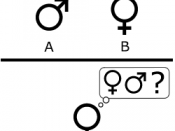Andrew Westbrook
Philosophy 101
Portfolio I
2)
Alan Turing was one of the great pioneers of the computer world. It is with his works that we now of the "The Turing Machine" and "Turing's Test." His research into the relationships between machines and nature created the field of artificial intelligence. His intelligence and foresight made him one of the first to step into the information age.
Alan Turing was born in London on June 23, 1912. As a young child science became a strong area of studies. Turing is known to us as the first man to develop the digital computer.
The concept of computers that would think for themselves was revolutionary for the time. Most computers in the 1950's were designed for a particular purpose or a limited range of purposes. What Turing envisioned was a machine that could do anything, anytime. The method of instructing the computer was very important in Turing's concept.
He essentially described a machine which knew a few simple instructions. Making the computer perform a particular task was simply a matter of breaking the job down into a series of these simple instructions.
The "Turing Test" believed that an intelligent machine could be created by following the blueprints of the human brain. He wrote a paper in 1950 describing what is now known as the "Turing Test." The test consisted of a person asking questions via keyboard to both a person and an intelligent machine. He believed that if the person could not tell the machine apart from the person after a reasonable amount of time, the machine was somewhat artificial intelligence.
At the time it was difficult to distinguish what artificial intelligence was. Many have said to have left the problem up to philosophers. In my opinion, computers are a perfect example...


